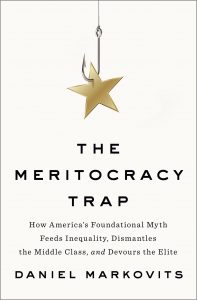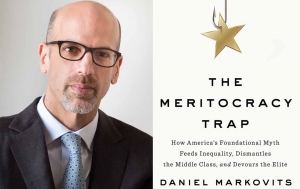Class Colloquium 5: Professor Daniel Markovits, The Meritocracy Trap; September 30th
Professor Markovits’ provocative bestseller, The Meritocracy Trap, compellingly argues that the Meritocracy System which began with our generation and governed the period of our own Yale admissions has become a system with negative societal consequences.
Impactful and surprising are his conclusions, that meritocracy::
- promotes and preserves socioeconomic inequality and political dysfunction,
- damages the middle class, and
- exacerbates the separation of meritocrats from all others.
Daniel Markovits’ seminal book places the genesis of modern Meritocracy in our own generation beginning in the 60s. Notably prior to Inslee Clark, Yale favored legacy admissions, rather than diversity, test scores, and other measures of “merit,” academic or otherwise. That changed under Brewster and Clark. Markovits then follows the results of that philosophic and ideological shift to the data-driven social, economic, and political conclusions he draws. We, in effect, loom as additional data for his ongoing analysis. So expect an active dialogue and the opportunity to support or even amend your own conceptions about Meritocracy as an favorable organizing principle of society.
Fair warning: Be prepared! Professor Markovits is articulate and argues from solid fact and data to reach unanticipated conclusions, many of which will challenge your thinking and unexamined premises. And he is very convincing!
Beginning with the dominant assumption of our age, that merit, not legacy or familial economic well-being, should be the determinants of access to opportunity, jobs, or an elite education, he proceeds to argue and show that this same principle is surprisingly associated with and causal of social, economic, and political dysfunction in America and elsewhere.
His arguments have been compared to those of Thomas Piketty’s Capital in the 21st Century. But Professor Markovits argues that meritocracy itself, and labor specifically, not just ownership of capital, are the main drivers of the observed socio-economic pathologies. He offers is a compelling and frank discussion of how to better manage our educational, economic, and societal goals. And he offers remedies, many of which are provocative and open to debate.
On its face, the idea that rewards should go to the most diligent, the hardest working, to the meritorious, is widely appealing. But how this philosophical approach has actually played out is far more complex and convoluted, hence deserving of your critical thinking and consideration.
 Well-researched, exquisitely written, The Meritocracy Trap has made a major contribution to the intellectual understanding of difficult class and wealth issues facing many advanced countries. Join the conversation. Be prepared for an interactive session. You’ll be glad you did!
Well-researched, exquisitely written, The Meritocracy Trap has made a major contribution to the intellectual understanding of difficult class and wealth issues facing many advanced countries. Join the conversation. Be prepared for an interactive session. You’ll be glad you did!
THE MERITOCRACY TRAP
How America’s Foundational Myth Feeds Inequality, Dismantles the Middle Class, and Devours the Elite
By Daniel Markovits
418 pp. Penguin Press
Click to register for this meeting:
https://zoom.us/meeting/register/tJEldO2qpj4sGdFLCTOoj0K8Ern_rRoln6_K
After registering, you will receive a confirmation by email containing information about joining the meeting.
We will start promply, so please JOIN the meeting 5-10 minutes early.
I hope you can attend. Don’t forget to register and mark your calendars.
Last, if you have any questions for our speaker, you can leave them on this quick-survey form.
BTW, if you haven’t used Zoom yet, Editor Wayne Willis has written a little how-to article to help you get over any technical concerns or questions; and if you need some personal support, he’s happy to call you and walk you through getting set up … for reasons outlined in that article. Just ping him at support@Yale1969.org.
About The Speaker
 Daniel Markovits is Guido Calabresi Professor of Law at Yale Law School and Founding Director of the Center for the Study of Private Law.
Daniel Markovits is Guido Calabresi Professor of Law at Yale Law School and Founding Director of the Center for the Study of Private Law.
Markovits works in the philosophical foundations of private law, moral and political philosophy, and behavioral economics. He publishes in a range of disciplines, including in Science, The American Economic Review, and The Yale Law Journal.
After earning a B.A. in Mathematics, summa cum laude from Yale University, Markovits received a British Marshall Scholarship to study in England, where he was awarded an M.Sc. in Econometrics and Mathematical Economics from the L.S.E. and a B.Phil. and D.Phil. in Philosophy from the University of Oxford. Markovits then returned to Yale to study law and, after clerking for the Honorable Guido Calabresi, joined the faculty at Yale.


